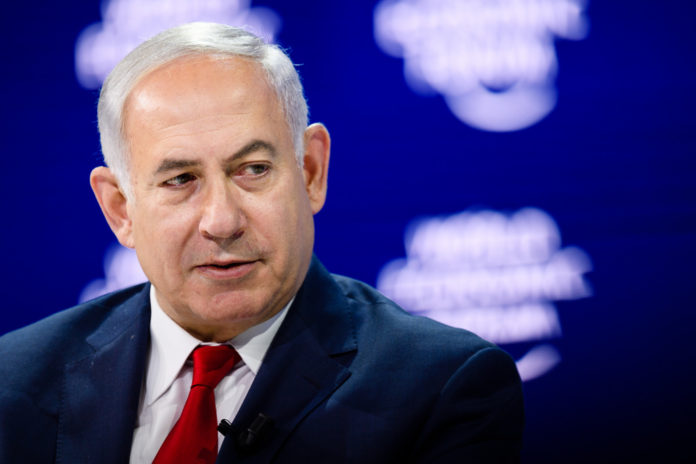
Israel’s Attorney General Avichai Mandelblit formally indicted Prime Minister Benjamin Netanyahu last night for bribery, fraud and breach of trust in three separate corruption cases, affirming his preliminary decision from February this year. In a dramatic televised statement, the Attorney General said he was taking the decision with “a heavy heart but wholeheartedly,” adding that “enforcement of the law is not optional” and that there were reasonable chances of conviction once the cases reached trial. Mandelblit rejected any accusations of political bias, saying it was “not a matter of right or left, or of politics” and that no other actor had influenced his decision. Incitement against the legal establishment was “dangerous and like playing with fire” and had to be “denounced and condemned,” he said.
Speaking shortly after Mandelblit in his own televised statement, Netanyahu continued to deny any wrongdoing and said the indictments were “an attempted coup against a sitting prime minister.” Netanyahu called the investigations “contaminated and wrongful” and accused police investigators and state prosecutors of “outside considerations,” “selective enforcement,” and unlawful investigation practices, adding that Mandelblit had not withstood the pressure from these other actors.
Netanyahu rejected any talk of resignation and vowed to continue leading the country “according to the law,” demanding an external committee be formed to “investigate the investigators.” “I won’t let the lie win,” he said.
Benny Gantz the leader of Blue and White said: “I have complete confidence in our law enforcement authorities led by Attorney General Dr. Avichai Mandelblit. I am sure that they carry out their work faithfully, honestly and professionally. There is no coup in Israel, but rather those that have barricaded themselves in power. In his appearance tonight, Netanyahu clearly demonstrated that he must step down from his position and focus on the charges against him. He is well aware that the grave and complex challenges facing the State of Israel, both in terms of security and in the societal and economic arenas, require a Prime Minister able to invest his full time, energy and attention.” Yisrael Beteinu leader Avigdor Lieberman said: “This is a difficult day for the State of Israel. We should give the prime minister the opportunity to prove his innocence in court.”
Netanyahu was supported by party colleagues, Likud Faction Chairman MK Miki Zohar said: “The first emotion that arises in me: Deep sadness. I am pained for the prime minister; what a ‘wonderful’ gift the state gave him for contributing his best years for our sakes. It was all known in advance, we knew that the attorney general would not withstand the pressure on him. We won’t be silent. We won’t back down.” Culture Minister Miri Regev said: “I want to support the prime minister and his family at this difficult time. You could see in his speech that he was speaking from his heart. The prime minister did well to continue in his post as the law enables him, to fight for his innocence and for the rule of democracy in the State of Israel. I am certain of his innocence.”
In “Case 1,000” Netanyahu is suspected of receiving illegal gifts from businessman Arnon Milchan worth up to £300,000 in return for acting in Milchan’s interest in a deal to sell an Israeli TV Channel (Channel 10) as well as helping him get a US visa, after Milchan’s was rescinded. Netanyahu is also alleged to have pursued a deal linked to Indian businessman Ratan Tata, who was Milchan’s business partner, and supported a law to extend tax breaks given to Israelis returning to live in the country after ten years (such as Milchan). Netanyahu is charged with fraud and breach of trust. Milchan has not been charged.
In “Case 2,000” Netanyahu is accused of working with Yediot Ahronot owner Arnon “Noni” Mozes for better media coverage, by offering to restrict circulation of rival newspaper Israel Hayom, which is financed by US-based Netanyahu supporter Sheldon Adelson. The indictment said that Netanyahu and Mozes “recognised that the one had the ability to promote the other’s interest” in the run-up to the 2015 elections and discussed such possibilities. Netanyahu claims he was not serious about the agreement and never intended to implement the deal. Netanyahu is charged with fraud and breach of trust. Moses has been charged with bribery.
In “Case 4,000” Netanyahu is suspected of promoting regulatory decisions that benefited Shaul Elovitch, the controlling shareholder in the Bezeq telecom giant, in exchange for positive coverage from the Elovitch-owned Walla news site. The indictment says the relationship between Netanyahu and Elovitch was “based on give and take,” and the Prime Minister’s actions benefiting Elovitch netted the businessman benefits to the tune of some NIS 1.8 billion ($500 million) in the period 2012-2017. In exchange, Elovitch’s Walla news site “published your political messages that you wished to convey to the public.” Netanyahu is charged with bribery, fraud and breach of trust. Elovitch is charged with bribery.
The real question in the days ahead is whether Netanyahu’s support holds within the Likud party. At this point Foreign Minister Israel Katz, Environment Minister Ze’ev Elkin, Justice Minister Amir Ohana, and party whip Miki Zohar have publicly come out in support of the embattled premier, stating that he was innocent until proven guilty and did not have to resign. Defence Minister Naftali Bennett and former Justice Minister Ayelet Shaked of The New Right party, who recently united with Likud, also issued statements of support and said there was no legal impediment to Netanyahu serving as prime minister in future even under an indictment.
In normal circumstances, Netanyahu would have 30 days to ask the Knesset to vote to grant him parliamentary immunity, but the Knesset House Committee, which grants immunity, has not been formed as no coalition has been agreed. It is also highly unlikely that 61 Knesset members would vote to give him immunity. Complicating matters is the fact that the Knesset only has until 11 December to form a governing coalition, otherwise the Knesset is dissolved and elections called to take place in March 2020.
There is also legal uncertainty as to whether Netanyahu could form a Government in the event that he emerged from an election with enough support to build a coalition. That is likely to be tested in the courts with petitions to the Supreme Court. If the Likud party thought it likely they would lose such a case they may opt to force an internal leadership primary to replace Netanyahu.
(BICOM)









